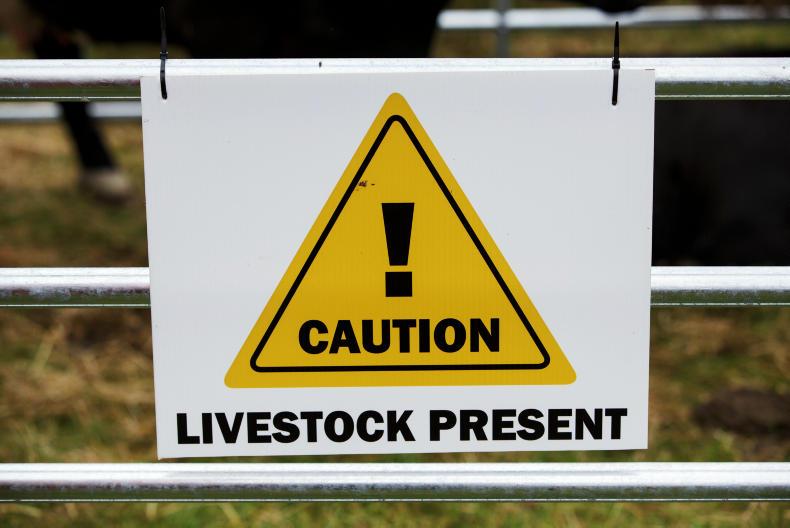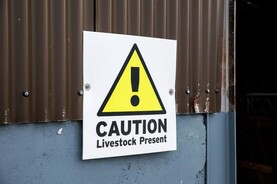Eighteen per cent of farm accidents result in the farmer being admitted to intensive care, a new study on farm safety has found. Launched for Farm Safety Week 2020, Trauma on Farms in the Republic of Ireland is a study of the data collected as part of the major trauma audit at the National Office of Clinical Audit.
Eighteen per cent of farm accidents result in the farmer being admitted to intensive care, a new study on farm safety has found.
Launched for Farm Safety Week 2020, Trauma on Farms in the Republic of Ireland is a study of the data collected as part of the major trauma audit at the National Office of Clinical Audit.
It found that in the years 2014 through 2016, 430 patients met the trauma audit and research network (TARN) and major trauma audit (MTA) inclusion criteria where the incident location was a farm.
Key findings include:
The median age of patients was 54.5 years; the patients ranged in age from less than one year old to 93 years of age.Falls of less than two metres (low falls) caused a quarter of major trauma in those under 65 years of age, and low falls make up almost one-third of patients over 65 years old.33% of paediatric patients presented as a result of a 'blow', 26% due to a vehicle incident and 19% as a result of a fall less than two metres.Peak attendances occurred at busy times of the year for farmers, in March and July.Most patients arrived on a Monday (16.3%).Farm trauma patients were more likely to arrive by helicopter (6%) than other MTA patients. Current data indicate that dairy farming is the most dangerous type of farming in the Republic of Ireland. Agriculture workers suffer more than twice as many non-fatal workplace injuries as workers in other sectors.This year’s campaign aims to reduce the number of accidents on farms and bring about a change in culture that makes unsafe practices socially unacceptable. The message for the campaign is: It's time to take safety seriously.
Farming continues to have one of the most inadequate safety records of any sector in Ireland. Last year, 19 people lost their lives in farm accidents. Fourteen people lost their lives so far in 2020.

Risks
Reacting to the figures, IFA president Tim Cullinan said that understanding the risks on and around a farm operation makes it easier to avoid dangers, and makes accidents less likely.
“However, all too often, farmers do not recognise the risks on their farms, which makes it difficult to manage the problem.
“Farmers have to be more careful, take their time and think about what could go wrong before they undertake any job (regardless of how small or simple they might perceive it to be). A single death is a death too many,” he said.
Traumas
Dr Conor Deasy, clinical lead of major trauma audit, NOCA, said the study shows the importance of farmers engaging with health and safety practices to prevent accidents occurring.
“The major traumas we describe result in life-threatening or life-changing injuries and happen twice as much on family farms than in other industries. Of note, farmers who sustain injuries are often older and have other medical problems making their care more complex.
“Unlike any other industry, the age range of those sustaining injuries on farms included infants to 90-year-olds. Given the devastation associated with these injuries, farming families must think safety first,” he said.
Pat Griffin, senior inspector with the Health and Safety Authority, said that farm safety needs to be proactively managed by every farmer and every contractor, supported and encouraged by all the major farming organisations.
“While the HSA can establish the regulatory base and provide detailed information and guidance on how to manage and control the risks, following this guidance is down to everyone in farming taking personal responsibility,” he said.
Concern
Gerry Boyle, director of Teagasc, said Teagasc is particularly concerned with the rise in farm workplace deaths so far in 2020: “Farmers perform hazardous work, and many dangers occur on farms daily. Farmers must be alert to dangers and take immediate preventative action. Avoiding haste and fatigue is crucial to prevent farm accidents.
“During Farm Safety Week, I would urge all farmers to put injury prevention on the top of their list and implement changes to make their farms safer places to work and live in for themselves and their families. I also appeal to farmers to maintain COVID-19 prevention guidelines to eliminate this deadly virus.”
Read more
Man dies in incident involving two motorbikes and tractor
Watch: Farmers urged to call out safety issues on farms
Calls for stricter laws for teenage tractor drivers





SHARING OPTIONS: